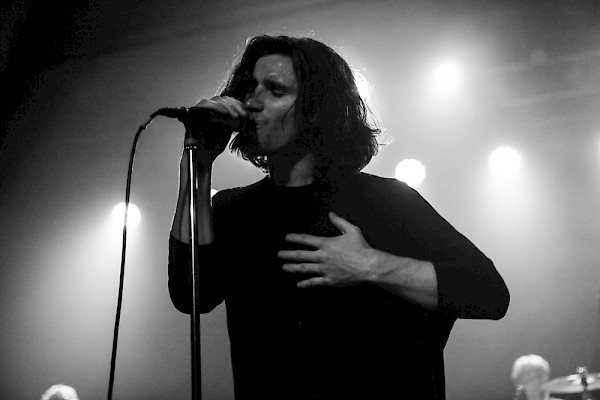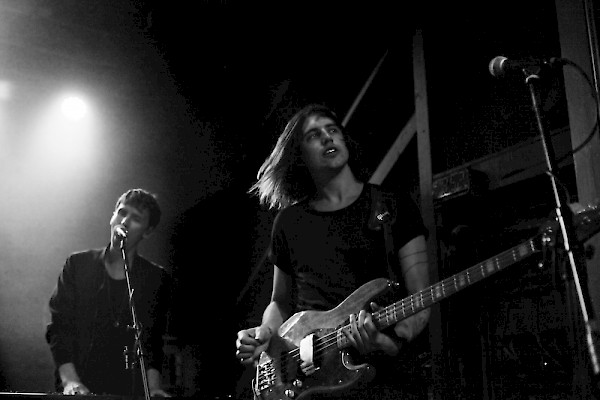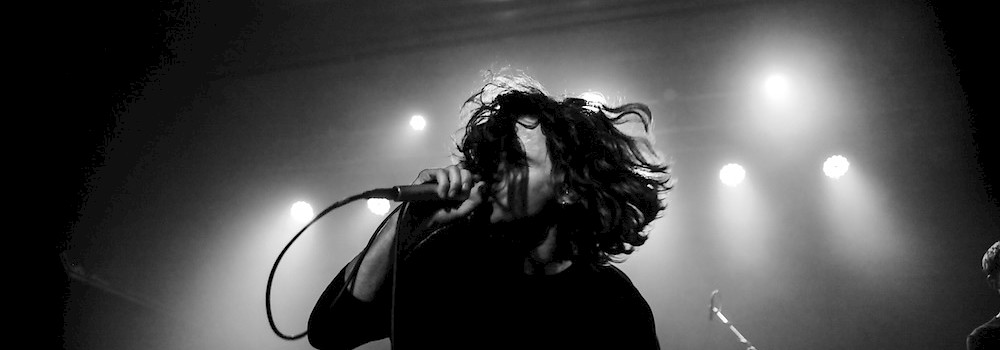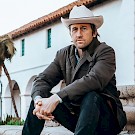 Caines onstage at the Hawthorne TheatreAre genre labels irrelevant? The Bristol-based group Coasts thinks they are, and rightfully so. The five-piece’s musical style is a multi-hyphenate blend of synth and indie rock. “Because of streaming culture, we listen to so many different types of music. So we can at one point be listening to Joey Bada$$ or Kanye and then we can be listening to Taylor Swift or a classic rock band or the best of the ’80s. You can take your influence from so many different places nowadays,” frontman Chris Caines says. “I think it’s more about the songs and the strength of the song at its core. You can dress it up however you want. You can have a really dancey song and then you can strip it back to have a more acoustic number and it will still work. It will still sound like you.”
Caines onstage at the Hawthorne TheatreAre genre labels irrelevant? The Bristol-based group Coasts thinks they are, and rightfully so. The five-piece’s musical style is a multi-hyphenate blend of synth and indie rock. “Because of streaming culture, we listen to so many different types of music. So we can at one point be listening to Joey Bada$$ or Kanye and then we can be listening to Taylor Swift or a classic rock band or the best of the ’80s. You can take your influence from so many different places nowadays,” frontman Chris Caines says. “I think it’s more about the songs and the strength of the song at its core. You can dress it up however you want. You can have a really dancey song and then you can strip it back to have a more acoustic number and it will still work. It will still sound like you.”
The British rockers met in college before forming the band in 2011. Live shows began in 2012, followed by four EPs over the course of 2013 and 2014. Fast-forward to 2016 and they are touring internationally and hitting the festival circuit to support their debut, self-titled album. With no genre-speak allowed, how would this burgeoning band describe their music? “Uplifting, nostalgic and summery,” according to Caines. From here, I was able to ask a few more specific questions about the band's arrival at this self-described sound.
What is your songwriting process like?
It’s kind of changed a little bit recently. When we first started the band, we all lived in the same city, so we used to practice in this really cheap little studio. We would jam for hours and hours. It got to a point when we started to tour, we couldn’t really afford to live away from home. We all met at university. Then we moved back home, which for us was a couple hours away. It changed the writing process completely. Liam writes the bare bones of the track, the chords, beat, then he’ll send it over to me and I’ll write the lyrics and melody. We’ll then get together and flesh out a song, jam it out and stuff. That’s how it’s worked mainly. The debut album is made up of songs that were written like that. With new stuff that we’re writing now, it’s changed again. I live in London and Liam lives in Brighton. I’ve been going down to Brighton a lot when we’re not touring. Liam will have a really nice chord sequence that he’s been playing with, and I’ll just sing nonsense over the top until we get something that works and we feel is good. We’ve written quite a few songs like that, which I think are really strong and will hopefully make it around to the second album.
Would you say you believe less is more? Why or why not?
Going back to what we were talking about earlier, it’s all about the strength of the song. If the song, when you strip it back, is a good song, then I think that will prevail whatever you do with it. I think with our first album, we really wanted to create an atmosphere and a vibe with all the songs we made—we threw a lot of marimbas in for that tropical sound at the beginning, so that’s featured quite prominently. I don’t know what the second album will be like. I think we want to have more guitar, a bit heavier. I think we enjoy doing that, playing it live. I think our live shows, we put so much energy into it and give 100 percent every time. It’s quite a visceral thing. We all go a bit mad with it. We’re really quite loud and heavy. We want that to translate across for the second album.
 Coasts members David Goulbourn and James Gamage at the Hawthorne TheatreCan you pinpoint a moment when your band realized that your music was gaining traction and starting to go somewhere?
Coasts members David Goulbourn and James Gamage at the Hawthorne TheatreCan you pinpoint a moment when your band realized that your music was gaining traction and starting to go somewhere?
When we first released a demo of "Oceans" about three to four years ago, it just snowballed and started to get loads of attention. Mainly from kids sharing it on Tumblr, SoundCloud and stuff. Over a couple years it amassed about 4 million [listens] on SoundCloud, which is amazing. It took us a little while to get a record deal off the back of that. That was a slow process to get our album out, which was frustrating for us. It’s been a bit more gradual. I don’t know if it appears that way to our fans or to the press. There hasn’t been one specific moment. The festivals last year, when we got to play those, like at Coachella we played in front of 8,000 people or something and then at Glastonbury another 8,000 to 10,000 people watched. That was kind of a moment like, “Wow, people must be connecting with the music we’re making.” It’s those moments. We’ve had our London and hometown shows that are always pretty big. We played at Roundhouse which is, I think, 2,000 people. That was an absolutely amazing experience. Those little moments.
How did you guys arrive at your current style/sound?
The whole band was born out of us becoming a bit disillusioned with what we were doing in previous bands. We had been making music that we thought would get us signed or thought was cool. We weren’t really enjoying it anymore that much. We decided to forget it all and start again. Some of the songs that made their way onto the album—like “Stay” and “Tonight”—we wrote in the first few weeks of stripping it back and just writing music that makes us feel good. I think the album is all about that. It’s about positivity and hopefulness. I think that really shines through in everything like the musicality, the lyrics and melody. We arrived at this sound because we were being honest and truthful. We love doing this and we wanted to impart that to our audience.
I’ve spoken with a number of artists on what changed between their start and when their music really took off, and the second they let go of what they thought people wanted to hear and focused on what they truly wanted, that’s when people started to pay attention and connect with it.
I think people connect with the honesty of it. What we were doing before maybe wasn’t quite as open and we weren’t being true to ourselves. Now we are and people are connecting with that, which is great.
What’s one track that you guys started to write, but between writing to recording, it turned out completely different?
“Lions” probably. It’s also probably my favorite track on the album. We had a really early demo of it back when we first started the band. It was a lot heavier and more bombastic. We decided to rewrite the verses, give it a different spin. I absolutely love it. It’s a lot more stripped back, the drums are more electronic. [Drummer] Ben [Street] played this crazy beat and then we chopped it all up. It was a really interesting process of completely changing the song and giving it a different vibe. I think it really worked. It gave the album something different that it hadn’t had previously.






